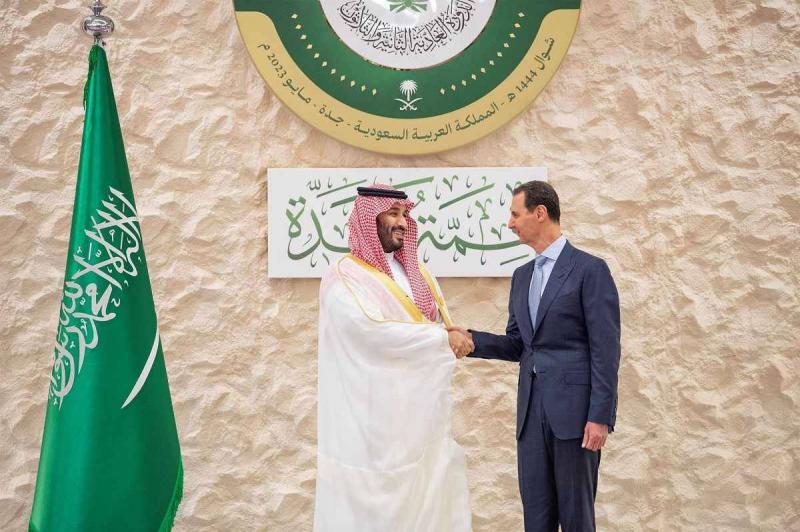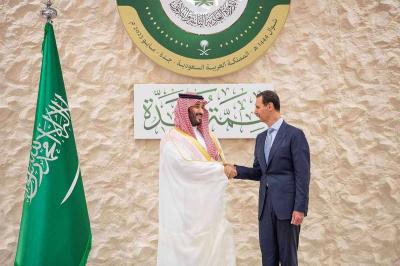Last week, Saudi Crown Prince Mohammed bin Salman, once marginalized on the international stage, took center stage when Arab nations restored Syria's seat in the Arab League, sending a message to Washington about who holds sway in the region. His warm reception of Syrian President Bashar al-Assad at the Arab summit, filled with hugs and kisses, challenged U.S. discontent over Syria's return to the Arab fold, marking the culmination of changing geopolitical tides favoring the prince.
Crown Prince Mohammed bin Salman aims to solidify the Kingdom's position as a regional power, leveraging its status as a major energy player in a world still reliant on oil and distracted by the war in Ukraine. After being ostracized internationally by Western nations following the murder of Saudi journalist Jamal Khashoggi in 2018, the prince has now re-emerged as a key player that Washington cannot ignore or distance itself from, albeit it must engage with him on pragmatic grounds.
The Saudi crown prince, who has questioned the sincerity of U.S. reassurances regarding the Kingdom's security and grown tired of reproachful tones, is now fostering relations with other global powers and realigning ties with mutual adversaries, while disregarding Washington's apprehension. His evident confidence on the global stage was not only apparent in his welcome of Assad but also when Ukrainian President Volodymyr Zelensky attended the Arab summit in Jeddah, where the crown prince offered to mediate between Kyiv and Moscow, a country allied with his oil production bloc.
Certainly, Saudi Arabia still relies militarily on the U.S., which saved the Kingdom from a potential invasion by Saddam Hussein in 1990, watches Iranian military activities in the Gulf, and supplies Riyadh with most of its arms. However, the crown prince is starting to pursue his own regional policies, showing less regard for his country's strongest ally amid what appears to be a diminishing U.S. interaction with Middle Eastern developments and a decline in attention to Riyadh's concerns.
Abdulaziz Al-Saqr, President of the Gulf Research Center, stated regarding the Arab summit: "This is a strong message to America that we are reshaping our relationships without you," noting that "Saudi Arabia's rapprochement with regional foes is based on its approach to regional security."
**Diplomatic Offensive**
Mohammed bin Salman's standing strengthened further last year when Western economies turned to the Kingdom to help tame the volatile oil market due to the war in Ukraine. This provided the prince with an opportunity to launch a diplomatic offensive that featured a prominent presence at the summit. This move gained support when Washington announced immunity for Mohammed bin Salman from prosecution regarding Khashoggi’s murder, despite U.S. intelligence concluding his direct involvement.
President Joe Biden's visit in July showcased Riyadh's restored influence, as the U.S. president left empty-handed while the prince secured a public commitment from the U.S. regarding Saudi security. Meanwhile, the shift in Saudi priorities away from reliance on the United States was evident when China mediated a settlement between Riyadh and Tehran earlier this year after years of enmity.
The agreement did not arise from Saudi strength, as Iran's allies emerged stronger than those of the Kingdom in Iraq, Syria, and Lebanon, controlling much of the populated territories in Yemen. Nevertheless, the agreement demonstrated Riyadh's ability to reduce losses and cooperate with U.S. adversaries to support its regional interests, such as soothing the Yemen conflict, where Saudi forces have been struggling since 2015.
Simultaneously, the prince pursued improved relations with Turkey and ended the boycott against Qatar, the neighbor he contemplated invading in 2017, as noted by Saudi writer Abdul Rahman Al-Rashed in Asharq Al-Awsat: "Over the past three years, the gap has been bridged and the relationship repaired."
**Pragmatic Relationship**
A Gulf official indicated that the "new relationship, characterized by direct pragmatism, has replaced the old oil-for-defense model due to what Riyadh perceives as a shaky security umbrella following the Arab uprisings in 2011." A senior U.S. State Department official stated that the relationship "is significant, spanning eight decades, crossing generations and administrations in our country and with leaders in Saudi Arabia." He added: "We have multiple interests when it comes to our relationship with Saudi Arabia. Our policy and engagement will seek to ensure that our relationship remains strong and capable of meeting our shared challenges in the future."
Riyadh felt that Washington had abandoned its long-time allies during the uprisings, fearing it might also forsake the House of Saud. At the same time, it believed that the U.S. pursuit of a nuclear deal with Tehran led it to overlook the increasing activities of Iranian proxies, which Riyadh views as a threat in the region.
A Saudi source close to the ruling circles pointed out what he considered leniency in enforcing sanctions on Iran and the reduction of forces in Syria, where a small U.S. unit previously prevented Iranian allies from taking control of territories. He remarked: "I believe that the countries in the region will, as a result, do what is best for them."
Meanwhile, Riyadh was disturbed by the U.S. withdrawal of support for Saudi operations in Yemen, which began after urging Riyadh to take responsibility for its security. The source said: "Without direct U.S. intervention or support for its military efforts, Riyadh had no choice but to strike a deal with Iran, even if that upset Washington." He added: "These are the repercussions of U.S. actions."
The Gulf official noted that "each side has a list of demands that the other is unwilling to meet." Nevertheless, both sides may have no choice but to set aside their grievances. The Kingdom may view the U.S. security umbrella as weakened, but still considers it essential for Saudi defense. Meanwhile, Western nations recognize that Riyadh's influence in the volatile oil market necessitates moving beyond their concerns and engaging with its actual ruler and future king.




